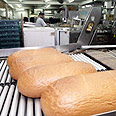
Archive photo
Photo: Shaul Golan
Egypt is looking for rapid solutions to a bread crisis that has generated riots in which at least two people have been killed.
Egyptian President Hosni Mubarak appealed to the army on Sunday, asking for help in manufacturing and distributing bread to keep up with the demand. He also asked for help from the government's defense and social solidarity ministries.
The authorities are trying to increase production and distribution to make up for bread shortages. There has been an increasing demand for subsidized bread in Egypt, especially in low-income areas.
Two people were recently killed in a row that broke out in a congested queue of people waiting for bread. Other reports in the local press say as many as nine other Egyptians have been killed in similar incidents, where guns were pulled out in bread lines.
Heba Kandil, a spokeswoman for the World Food Programme (WFP) Cairo office, told The Media Line the latest crisis in Egypt was part of the global food predicament.
'Egypt feeling the impact of rising food prices'
This has emerged from a number of factors, including the rise in oil and energy prices, the economic boom in nations like India and China which is increasing demand, climate and weather-related events such as droughts and floods, and competition between food and fuel, where more land and agricultural crops are being used for bio-fuels than for food.
The rise in commodities and wheat has made unsubsidized bread unaffordable for a large portion of the Egyptian population.
The poor people are the most vulnerable to price pressures, as nearly a fifth of the country's population is living below the lower poverty line on less than one dollar a day, Kandil said.
However, they are not the only ones to feel the heat of the crisis.
"We're seeing middle income classes getting sucked into it," Kandil said. "The salary increases are not rising sufficiently to cope with the price increases."
"Egypt is feeling the impact of rising food prices even more because it imports a significant amount of its food requirements – including 12 million metric tons of cereals – annually. This is putting a lot of pressure on prices of commodities and utilities," he added.
The government is tightening its control over subsidized flour to ensure it does not reach the black market. Non-subsidized bread is sold for as much as five times the price of subsidized bread.
The Egyptian government has significantly boosted its spending on subsidies. The government is being cautious about the notion of putting up the price of bread, especially with the specter of the 1977 bread riots still in the public consciousness. Around 70 people were killed in those riots when the government tried to remove subsidies from basic commodities.
Reprinted by permission of The Media Line















